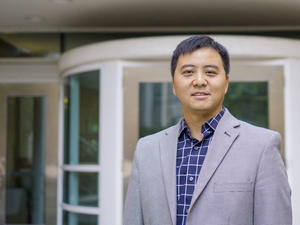"Developing New Battery Chemistries for Sustainable Energy Storage," by Tianbiao Liu

Abstract
In response to rapid increasing energy storage demands of consuming electronics, electrical vehicles, electrical grids, and renewable energy integration, there is an urgent call for advanced rechargeable batteries with superior energy storage performance and more affordable material costs compared to existing battery technologies. The presentation will cover our research efforts in developing new battery chemistries towards sustainable and economical electrochemical energy storage. Through rational molecular engineering, we have designed and applied redox active molecules including viologen (anolyte), quinone (anolyte), TEMPO (catholyte), ferrocene (catholyte), and ferrocyanide (catholyte) for developing aqueous organic redox flow batteries (AORFBs). The chemistry and battery performance of redox active molecules will be discussed in detail. In addition, the chemistry of quinone based redox active MOFs and their applications in developing Li metal rechargeable batteries will also be presented. Particularly, this presentation emphasizes that in-depth mechanistic understandings of redox active materials at the molecular level play crucial roles in developing new generation of rechargeable batteries.
Biography
Dr. Tianbiao Leo Liu received his PhD from Texas A&M University in 2009, served as staff scientist at Pacific Northwest National Laboratory from 2013 to 2015, and currently is an assistant professor of chemistry and materials science at Utah State University. His research is broadly spread on energy and green chemistry including electrochemical energy storage, electrocatalysis, and environmentally benign chemical transformations. Dr. Liu’s research has been recognized by a number of academic awards and honors, including 2015 ACS Catalysis Lectureship, 2017-2019 RCSA Scialog Fellow on Advanced Energy Storage, and 2017 Utah Energy Triangle Faculty Award, 2018 Chemical Communications Emerging Investigator, 2019 NSF Career Award.
Seminar sponsored by the Department of Chemical and Biomolecular Engineering